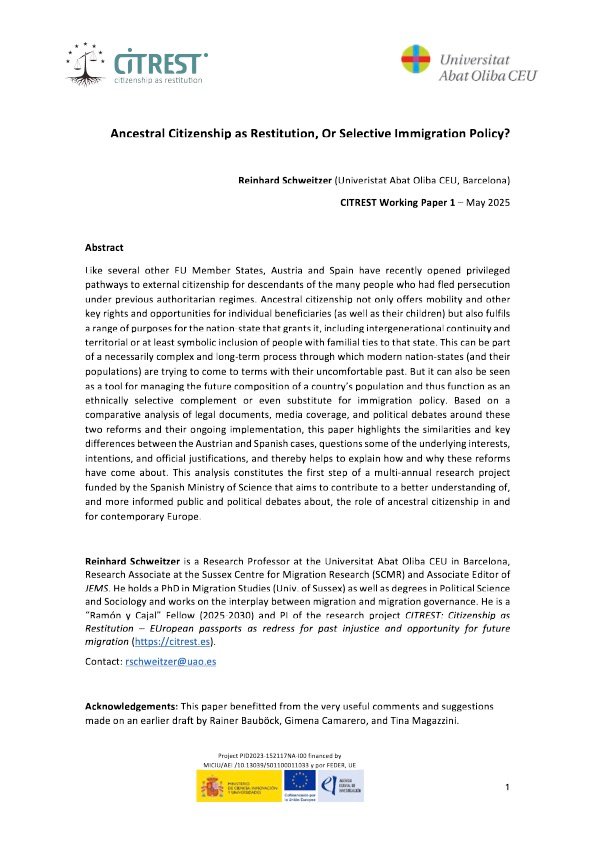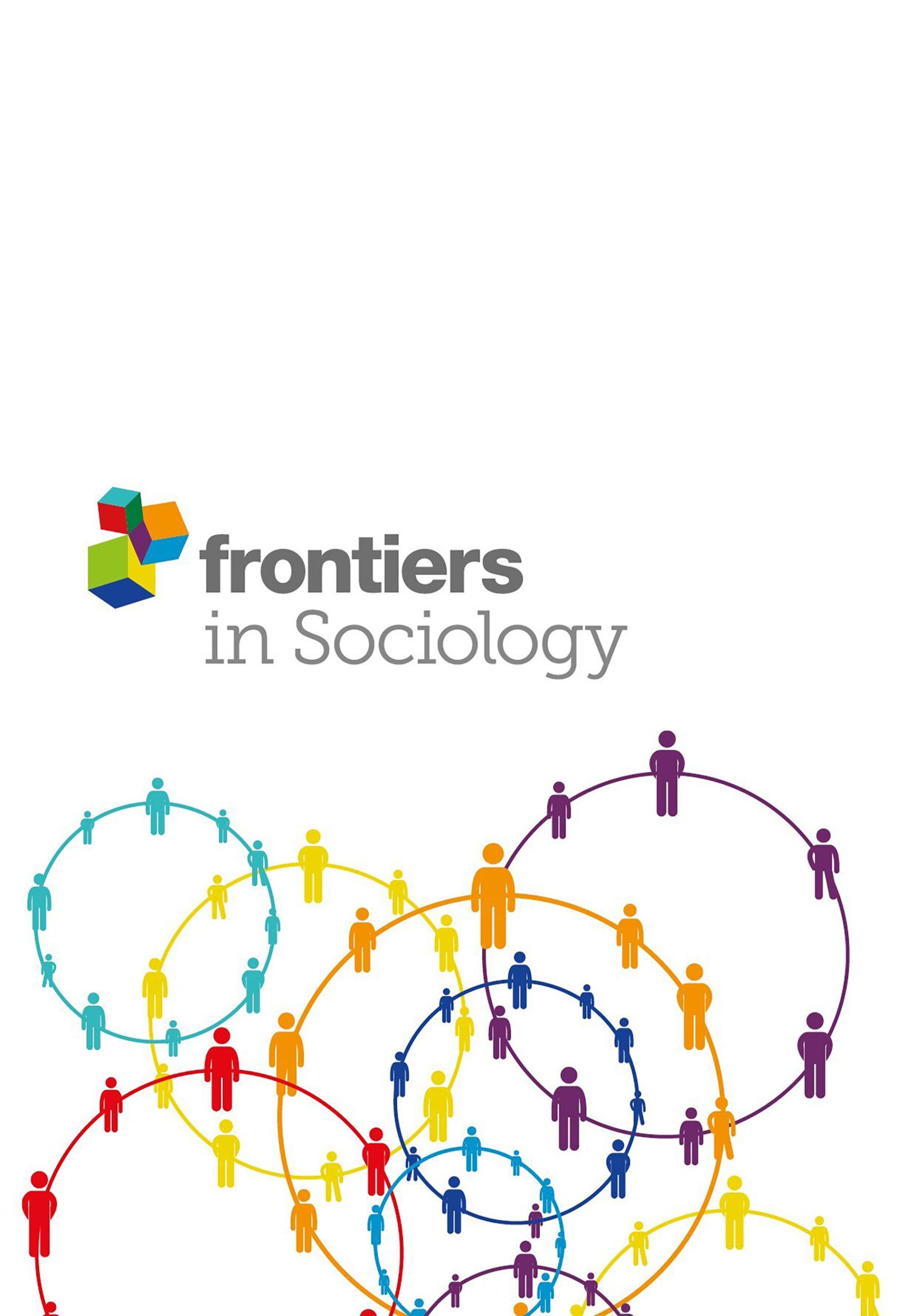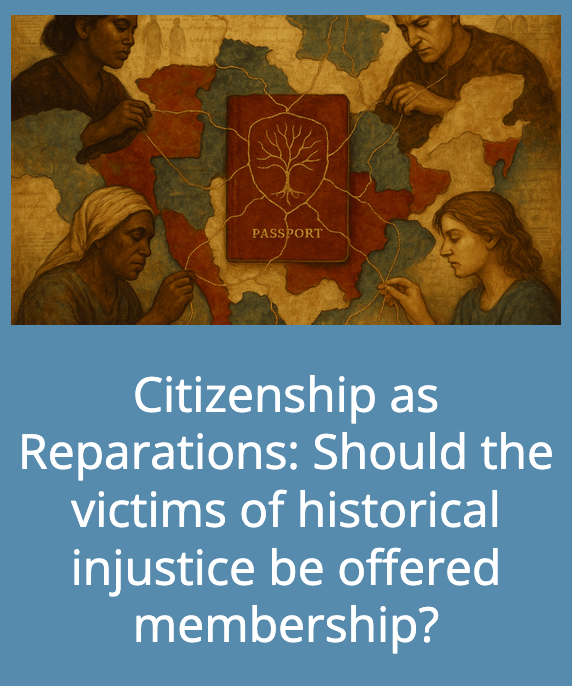
Reinhard Schweitzer
¿Nacionalidad ancestral como restitución o como política de inmigración selectiva? Documento de trabajo
2025.
Resumen | Enlaces:
@workingpaper{nokey,
title = {¿Nacionalidad ancestral como restitución o como política de inmigración selectiva? },
author = {Reinhard Schweitzer},
url = {https://citrest.es/wp-content/uploads/2025/05/WP1_FINAL_May2025.pdf, Descargar PDF},
year = {2025},
date = {2025-05-19},
urldate = {2025-05-19},
issue = {CITREST Working Paper 1},
abstract = {Al igual que otros Estados miembros de la UE, Austria y España han abierto recientemente vías preferenciales para obtener la nacionalidad por ascendencia para los descendientes de las numerosas personas que huyeron de la persecución bajo regímenes autoritarios anteriores. La nacionalidad por ascendencia no solo ofrece movilidad y otros derechos y oportunidades clave para los beneficiarios (y sus hijos), sino que también cumple diversos propósitos para el Estado que la otorga, como la continuidad intergeneracional y la inclusión territorial, o al menos simbólica, de las personas con vínculos familiares con dicho Estado. Esto puede formar parte de un proceso necesariamente complejo y prolongado mediante el cual los Estados modernos (y sus poblaciones) intentan reconciliarse con su incómodo pasado. Pero también puede considerarse una herramienta para gestionar la futura composición demográfica de un país y, por lo tanto, funcionar como un complemento o incluso un sustituto, desde una perspectiva étnica, de la política de inmigración. Basándose en un análisis comparativo de documentos legales, cobertura mediática y debates políticos en torno a estas dos reformas y su implementación, este artículo destaca las similitudes y diferencias clave entre los casos austriaco y español, cuestiona algunos de los intereses, intenciones y justificaciones oficiales subyacentes, y contribuye así a explicar cómo y por qué se han producido estas reformas. Este análisis constituye el primer paso de un proyecto de investigación plurianual financiado por el Ministerio de Ciencia de España, cuyo objetivo es contribuir a una mejor comprensión y a debates públicos y políticos más informados sobre el papel de la nacionalidad ancestral en la Europa contemporánea.},
keywords = {},
pubstate = {published},
tppubtype = {workingpaper}
}
Al igual que otros Estados miembros de la UE, Austria y España han abierto recientemente vías preferenciales para obtener la nacionalidad por ascendencia para los descendientes de las numerosas personas que huyeron de la persecución bajo regímenes autoritarios anteriores. La nacionalidad por ascendencia no solo ofrece movilidad y otros derechos y oportunidades clave para los beneficiarios (y sus hijos), sino que también cumple diversos propósitos para el Estado que la otorga, como la continuidad intergeneracional y la inclusión territorial, o al menos simbólica, de las personas con vínculos familiares con dicho Estado. Esto puede formar parte de un proceso necesariamente complejo y prolongado mediante el cual los Estados modernos (y sus poblaciones) intentan reconciliarse con su incómodo pasado. Pero también puede considerarse una herramienta para gestionar la futura composición demográfica de un país y, por lo tanto, funcionar como un complemento o incluso un sustituto, desde una perspectiva étnica, de la política de inmigración. Basándose en un análisis comparativo de documentos legales, cobertura mediática y debates políticos en torno a estas dos reformas y su implementación, este artículo destaca las similitudes y diferencias clave entre los casos austriaco y español, cuestiona algunos de los intereses, intenciones y justificaciones oficiales subyacentes, y contribuye así a explicar cómo y por qué se han producido estas reformas. Este análisis constituye el primer paso de un proyecto de investigación plurianual financiado por el Ministerio de Ciencia de España, cuyo objetivo es contribuir a una mejor comprensión y a debates públicos y políticos más informados sobre el papel de la nacionalidad ancestral en la Europa contemporánea.

Francesco Pasetti, Reinhard Schweitzer
Mirando hacia atrás y hacia el extranjero mientras (no) avanzamos. Migración, ideas y estabilidad de la nacionalidad en España. Artículo científico
En: Frontiers in Sociology (online first), 2025.
Más información | Resumen | Enlaces:
@article{nokey,
title = {Mirando hacia atrás y hacia el extranjero mientras (no) avanzamos. Migración, ideas y estabilidad de la nacionalidad en España.},
author = {Francesco Pasetti and Reinhard Schweitzer},
editor = {Salvatore Strozza and Rosa Gatti and Gianni D'Amato and Margit Fauser},
url = {https://doi.org/10.3389/fsoc.2025.1570110, Full-Text Access
https://citrest.es/wp-content/uploads/2025/07/PasettiSchweitzer2025_Looking-back-and-abroad-time-not-moving-forward.pdf, Descargar PDF
https://www.frontiersin.org/research-topics/62947/the-nacionalidad- de inmigrantes-internacionales-repensando-la-migración-nacionalidad-Anexo al día/, Acceda al tema especial
},
doi = {10.3389/fsoc.2025.1570110},
year = {2025},
date = {2025-07-03},
urldate = {2025-07-03},
journal = {Frontiers in Sociology (online first)},
abstract = {Este artículo aborda la notable estabilidad del régimen de nacionalidad español. Desde su instauración en 1982, se ha mantenido prácticamente inalterado, a pesar de la rápida transformación del país, que pasó de ser un país de emigración a un importante destino para inmigrantes extracomunitarios. Complementamos las explicaciones existentes sobre este fenómeno centrando el análisis en el ámbito de las ideas. A partir de un análisis detallado del proceso legislativo y los debates parlamentarios sobre las reformas de la nacionalidad entre 1978 y 2024, argumentamos que esta sorprendente estabilidad puede atribuirse, en parte, a la concepción de nacionalidad, ampliamente compartida y notablemente estable, de la élite política española. Identificamos tres elementos constitutivos que conforman este marco dominante de la nacionalidad: (i) la preferencia por los lazos de sangre sobre la presencia territorial, (ii) el trato preferencial a los emigrantes (y sus descendientes) frente a los inmigrantes, y (iii) la predilección por las conexiones históricas de los potenciales ciudadanos con España frente a las contemporáneas. Este conjunto de ideas, en el que coinciden las posturas de los partidos políticos, ha marcado la evolución de las leyes de nacionalidad del país. Ha sobrevivido no solo a los cambios demográficos, sino también a los políticos, incluyendo la aparición del primer partido de extrema derecha y antiinmigrante del país. Al centrarse en las ideas, este artículo ofrece una nueva perspectiva analítica y menos determinista, que complementa el marco explicativo aportado hasta la fecha por los estudios sobre la legislación de la nacionalidad. Nuestros hallazgos y análisis contribuyen a una comprensión más completa de la política de nacionalidad en España y, en términos más generales, del papel ambiguo que las dinámicas migratorias pasadas, presentes y futuras pueden desempeñar en la configuración de la evolución de la legislación de la nacionalidad. De este modo, también contribuye a la literatura sobre el nexo multifacético entre nacionalidad y migración, y a los debates más amplios sobre la importancia de las ideas en la formulación de políticas públicas.},
keywords = {},
pubstate = {published},
tppubtype = {article}
}
Este artículo aborda la notable estabilidad del régimen de nacionalidad español. Desde su instauración en 1982, se ha mantenido prácticamente inalterado, a pesar de la rápida transformación del país, que pasó de ser un país de emigración a un importante destino para inmigrantes extracomunitarios. Complementamos las explicaciones existentes sobre este fenómeno centrando el análisis en el ámbito de las ideas. A partir de un análisis detallado del proceso legislativo y los debates parlamentarios sobre las reformas de la nacionalidad entre 1978 y 2024, argumentamos que esta sorprendente estabilidad puede atribuirse, en parte, a la concepción de nacionalidad, ampliamente compartida y notablemente estable, de la élite política española. Identificamos tres elementos constitutivos que conforman este marco dominante de la nacionalidad: (i) la preferencia por los lazos de sangre sobre la presencia territorial, (ii) el trato preferencial a los emigrantes (y sus descendientes) frente a los inmigrantes, y (iii) la predilección por las conexiones históricas de los potenciales ciudadanos con España frente a las contemporáneas. Este conjunto de ideas, en el que coinciden las posturas de los partidos políticos, ha marcado la evolución de las leyes de nacionalidad del país. Ha sobrevivido no solo a los cambios demográficos, sino también a los políticos, incluyendo la aparición del primer partido de extrema derecha y antiinmigrante del país. Al centrarse en las ideas, este artículo ofrece una nueva perspectiva analítica y menos determinista, que complementa el marco explicativo aportado hasta la fecha por los estudios sobre la legislación de la nacionalidad. Nuestros hallazgos y análisis contribuyen a una comprensión más completa de la política de nacionalidad en España y, en términos más generales, del papel ambiguo que las dinámicas migratorias pasadas, presentes y futuras pueden desempeñar en la configuración de la evolución de la legislación de la nacionalidad. De este modo, también contribuye a la literatura sobre el nexo multifacético entre nacionalidad y migración, y a los debates más amplios sobre la importancia de las ideas en la formulación de políticas públicas.

Reinhard Schweitzer, Tina Magazzini
Restitución de la nacionalidad como política (encubierta) de inmigración selectiva Online
David Owen, Rainer Bauböck: 2025, visitado: 16.05.2025.
Más información | Resumen | Enlaces:
Contribución invitada al Foro GLOBALCIT «La nacionalidad como reparación: ¿Deberían ser admitidas las víctimas de injusticias históricas?»
Observatorio de Nacionalidad Global, Robert Schuman Centre, Instituto Universitario Europeo. Visite: https://globalcit.eu/
Observatorio de Nacionalidad Global, Robert Schuman Centre, Instituto Universitario Europeo. Visite: https://globalcit.eu/
@online{nokey,
title = {Restitución de la nacionalidad como política (encubierta) de inmigración selectiva},
author = {Reinhard Schweitzer and Tina Magazzini},
editor = {David Owen and Rainer Bauböck},
url = {https://globalcit.eu/citizenship-as-reparations-should-the-victims-of-historical-injustice-be-offered-membership/9/, Leer en línea},
year = {2025},
date = {2025-05-16},
urldate = {2025-05-16},
institution = {Globalización Nacionalidad Observatorio, Robert Schuman Centre, European University Institute.},
abstract = {La pregunta central que plantean David Owen y Rainer Bauböck al inicio de este foro es si la nacionalidad constituye una forma apropiada de reparación por la injusticia histórica y si debería ofrecerse no solo a las víctimas, sino también a sus descendientes. Las respuestas tan variadas y matizadas que ha suscitado su artículo hasta el momento sugieren que es difícil responder a esta pregunta con un simple sí o no. En nuestra contribución a este debate, queremos dar un paso atrás y preguntarnos si los Estados que enmarcan las ofertas de nacionalidad en términos de reparación podrían estar, en cambio —o además—, intentando atraer inmigrantes deseables.},
keywords = {},
pubstate = {published},
tppubtype = {online}
}
La pregunta central que plantean David Owen y Rainer Bauböck al inicio de este foro es si la nacionalidad constituye una forma apropiada de reparación por la injusticia histórica y si debería ofrecerse no solo a las víctimas, sino también a sus descendientes. Las respuestas tan variadas y matizadas que ha suscitado su artículo hasta el momento sugieren que es difícil responder a esta pregunta con un simple sí o no. En nuestra contribución a este debate, queremos dar un paso atrás y preguntarnos si los Estados que enmarcan las ofertas de nacionalidad en términos de reparación podrían estar, en cambio —o además—, intentando atraer inmigrantes deseables.


Cerrar